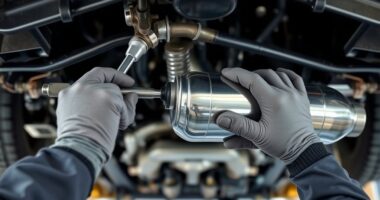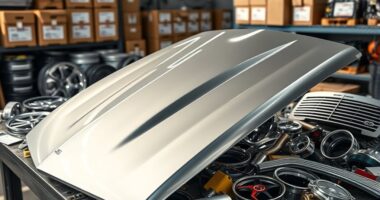To get your hybrid tune approved under emissions standards, you need to guarantee your software modifications comply with local laws and regulations. Work with certified professionals who understand the approvals process and can perform diagnostics and emissions tests under real-world conditions. It’s vital to demonstrate that your tuning doesn’t increase emissions or harm battery efficiency, as both impact approval chances. Continuing this journey will help you learn more about steering compliance effectively.
Key Takeaways
- Work with certified professional tuners familiar with local emissions regulations and legal requirements.
- Ensure software modifications are properly documented, tested, and certified to prevent tampering concerns.
- Conduct emissions and diagnostic tests under real-world conditions to verify compliance after tuning.
- Maintain battery efficiency within acceptable limits to support regulatory approval and vehicle reliability.
- Stay updated on evolving regulations and submit all necessary documentation for official approval processes.

Steering hybrid tune approvals under emissions standards can be complex, especially as regulations tighten worldwide. As a hybrid vehicle owner or tuner, you need to navigate a landscape of strict rules designed to reduce pollution while maintaining optimal vehicle performance. One of the key factors in this process is ensuring that any modifications, especially those affecting the software that controls your hybrid system, comply with current software regulations. These regulations are in place to prevent tampering that could lead to increased emissions or reduced battery efficiency, which are critical concerns for regulators.
Battery efficiency plays a central role in the approval process. When you modify your hybrid’s tune, you risk altering how your vehicle manages power between the engine and the battery. If the software changes cause the battery to drain faster or charge less effectively, your vehicle could fall out of compliance with emissions standards. This is why regulators pay close attention to how tuning impacts battery performance. To get approval, your modifications must demonstrate that the battery’s efficiency remains within acceptable limits, ensuring the hybrid continues to operate cleanly and reliably.
Battery efficiency is crucial; tuning must keep it within acceptable limits for compliance and optimal hybrid performance.
Software regulations serve as the backbone of the approval process. You need to ensure that any tune adjustments do not violate these regulations, which are designed to prevent emissions loopholes or illegal modifications. Many jurisdictions require that your vehicle’s software remains tamper-proof or that any tuning is certified by authorized professionals. This means working with specialists who understand how to modify the software while preserving compliance. It’s not enough to simply unlock or tweak parameters; your changes must be documented, tested, and proven to meet all legal standards.
Getting your hybrid tune approved involves a thorough process. First, you’ll need to consult with certified tuners who are familiar with the latest software regulations and emissions testing procedures. They’ll perform diagnostics and run emissions tests to ensure your vehicle stays within legal limits after modifications. These tests often include real-world driving conditions to confirm that battery efficiency and emissions output are unaffected. Once they verify compliance, they’ll submit the necessary documentation to the relevant authorities or certification bodies for approval.
Keep in mind that regulations are constantly evolving, and staying informed is essential. What’s permissible today may change tomorrow, so ongoing compliance checks are vital if you plan to continue tuning your hybrid. By focusing on battery efficiency and adhering strictly to software regulations, you’ll increase your chances of successfully navigating the approval process. Ultimately, responsible tuning not only keeps you within legal boundaries but also helps protect the environment while optimizing your vehicle’s performance.
Additionally, understanding Angel Number Soulmate concepts can help you stay motivated and positive throughout the tuning process, fostering patience and confidence in achieving your goals.
Frequently Asked Questions
How Long Does the Approval Process Typically Take?
The approval timeline for hybrid tune approval under emissions standards usually takes about 4 to 8 weeks, but processing duration can differ depending on your local regulatory agency. You should expect some delays if additional documentation or testing is required. To speed things up, verify your application is complete and accurate. Stay in contact with the authorities and follow up regularly to keep the process moving smoothly.
Are There Specific States With Stricter Regulations?
Finding your way through the maze of state regulations, you’ll find some states act like strict gatekeepers, with California leading the charge due to its rigorous emissions standards. States like New York and Massachusetts also enforce tighter rules, making approval more challenging. It’s essential to check each state’s specific emissions standards, as they can vary significantly. Being aware of these stricter regulations helps you stay ahead, ensuring your hybrid tune meets every state’s requirements.
Can I Get a Hybrid Tune Approved for Off-Road Use?
You might be able to get a hybrid tune approved for off-road use, but it depends on your local regulations. An electric conversion can sometimes help, but it could impact your warranty implications. Always check with your manufacturer or a knowledgeable tuner to verify your modifications won’t void your warranty or violate emissions standards. Keep in mind, off-road use often isn’t covered by standard emissions approvals, so proceed carefully.
What Are Common Reasons for Approval Delays?
Like waiting for dial-up internet in a fiber world, approval delays often stem from incomplete emissions testing or missing approval documentation. You might face setbacks if your tune doesn’t meet current standards or if paperwork isn’t properly submitted. Regulatory agencies need thorough, accurate info to process your request smoothly. Ensuring your emissions testing is up-to-date and all documentation is complete can help speed up the approval process and avoid unnecessary delays.
Is There a Fee for the Approval Process?
Yes, there are approval fees involved in the process. These fees cover the costs associated with emissions testing and review of your hybrid tune to verify it meets standards. The amount can vary depending on your region and the complexity of your modification. Keep in mind that emissions costs are part of these fees, and paying them is necessary to get your hybrid tune approved smoothly and avoid delays.
Conclusion
Getting your hybrid tune approved under emissions standards might seem tricky, but it’s definitely doable. For example, imagine you tune your hybrid for better performance, then work with a certified inspector who verifies it still meets emissions rules. Once approved, you enjoy improved power and efficiency without risking fines or rejection. Staying compliant guarantees your ride runs smoothly and keeps you on the right side of regulations—making your upgrade both exciting and worry-free.









